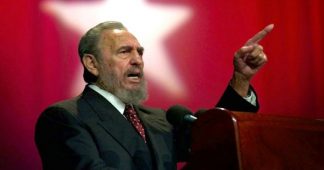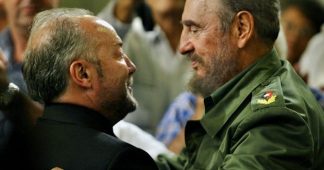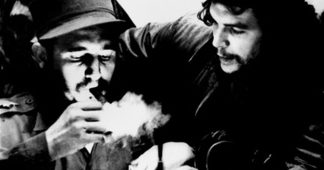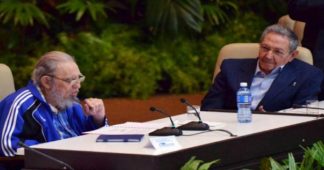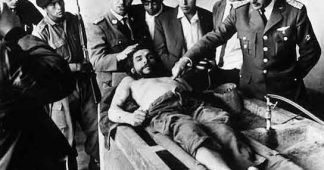Long Live Fidel, Commander of the ALBA
Today, we say goodbye to one of the biggest patriots of Latin America, and why we lament his death, we evoke his example of humanity, we embrace each other and we continue walking the path of the undefeated leader of the Cuban Revolution and the unity of the peoples against colonialism and imperialism. Fidel definitively enters history with an enormous legacy.
With dignity, heroism, and strategic clarity he built, along with the Cuban people, an anti-imperialist revolution only 90 miles away from the epicenter of imperialism. He struggled tirelessly for sovereignty, and was capable of building a socialist model by prioritizing the basic needs of the population: health, education, culture, peace, safety and human development—which made Cuba an exception in the continent, generally oppressed and vastly unequal due to imperialism and big capital.
Besides, the Cuban Revolution was, since day one, an example of international solidarity, thereby enacting the principle of José Martí: “our motherland is humanity”. He created medical brigades and other organisms to support the peoples of the world in difficult times.While the hypocritical of international diplomacy invented the business of war and social catastrophes, Fidel and the Cuban revolution showed a real alternative based in humanism and solidarity, fighting against imperialism, warning about the risks of so-called “progress” that capitalism offers, with its wave of violence, plundering, environmental devastation and growing misery.
Castro’s Legacy for Cuba, Latin America, and the World (+Video)
GREGORY WILPERT, TRNN: Welcome to the Real News Network. Im Gregory Wilpert coming to you from Quito, Ecuador.
On August 13 Fidel Castro celebrated his 90th birthday in Havana, Cuba with an enormous party and cultural festivities. Although Castro resigned from Cubas presidency almost 10 years ago, he continues to be both revered and demonized around the world. Local media all carried an article that Castro had written for his birthday in which he reviewed his life experience and thanked his people for their best wishes. At the end of the article, he spoke highly of the wisdom of the Chinese and Russian people and criticized the US government for the crimes it had committed. So joining us to discuss Castros legacy is Aviva Chomsky. Aviva is a professor of history and coordinator of Latin American studies program at Salem State University. An author of many books including A History of the Cuban Revolution, the Cuban Reader, and her latest book is titled Undocumented: How Immigration Became Illegal.
Thanks for being on the Real News Aviva.
AVIVA CHOMSKY: Thanks a lot for inviting me to speak with you.
WILPERT: So Cubans and supporters of the Cuban Revolution around the world celebrated Castros birthday last weekend. And you are a historian of Cuba and have written quite a lot about the country. I was thinking maybe you could tell us briefly as to what would you say is Castros legacy for Cuba, for the country?
CHOMSKY: Well the Cuban Revolution brought about enormous profound and long lasting changes in Cuban society. Historians love to study revolutions and I would say the Cuban Revolution is one of a handful of extremely profound revolutions that changed the direction of the country in so many ways. So Fidel Castros legacy is everywhere in Cuba in the fact that he not only led the Cuban Revolution, and here Im talking about the revolutionary process that starts after January 1st, 1959. Not the war that brought the July 26th coalition to power, but the revolutionary process what really transformed Cuban society from the bottom up.
Africa: Long Live Fidel
If Africa is a country, then Fidel Castro is one of our national heroes.
After fronting the Cuban revolution against a corrupt, American-sponsored dictatorship in 1959, Cuba under Fidel worked hard to develop its own distinct foreign policy independent from its more powerful neighbor, the United States, or its supposed ally, the Soviet Union. Africa became central to that foreign policy. For me, and people of my generation, Fidel Castro entered our consciousness as a hero of our liberation. He wasn’t just fighting for an abstract cause. He was literally fighting for us.
One of Castro’s central foreign policy goals was “internationalism” – the promotion of decolonization and revolutionary politics abroad. This involved sending troops to fight in wars against colonial or proxy forces on the African continent, as well as supporting those movements with logistics and technical support. Cuba sent troops, but it also sent tens of thousands of Cuban doctors, dentists, nurses, health-care technicians, academics, teachers and engineers to the continent and elsewhere. That a significant proportion of Cubans trace their ancestries to West and Central Africa (owing to slavery) contributes to this politics. It is important to note that critics of Cuba have pointed to the paradox of this policy: while Cuba has a progressive foreign policy on race, at home Afro-Cubans have often been at odds with the Communist Party’s failure to reflect the full range of Cuba’s racial diversity in its leadership structures or to fully address race politics. Nevertheless, this doesn’t detract from Cuba’s Africa policy.
Black America and the Passing of Fidel Castro
It is impossible to discuss Fidel Castro outside of an examination of the Cuban Revolution. And, while I hear that there are many Cuban Americans dancing with glee upon news of the death of President Castro, I know that the emotions within Black America are and will continue to be quite different.
For any Black American who knows anything about the history of the Western Hemisphere, both Cuba and Haiti have a special significance. Haiti, of course, for successfully ousting the French in 1803 and forming the second republic in the Americas; a Black republic. Cuba, in 1959, kicked out the USA, the Mafia, and a corrupt ruling class that had enforced racist oppression against most of the Cuban population. In the cases of Haiti and Cuba, their audacity in the face of a racist imperialism brought forth the wrath of their opponents. How dare the Cubans stand up to the USA? How could a country of all of these ‘brown’ and ‘black’ people insist that they should determine their own destinies?
Fidel Castro, Defender of Independence Struggles in Africa
The approach of the Revolutionary leader Fidel Castro to the African continent consisted of political, social and economic alliances in order to advance in the anti-imperialist struggle.
The Cuban leader was part of Angola’s independence (South of the continent) a process that originated the emancipation of its people, he also helped to liberate Namibia and Zimbabweasí (also to the south) said the writer, José Daniel Fierro, in the web Rebelión.
At the same time, in South Africa, Castro’s brotherhood with Nelson Mandela (lawyer, politician, and South African philanthropist, President of that country between 1994 and 1999) had one of its principles the struggle against Apartheid (racial segregation system in South Africa and Namibia).
